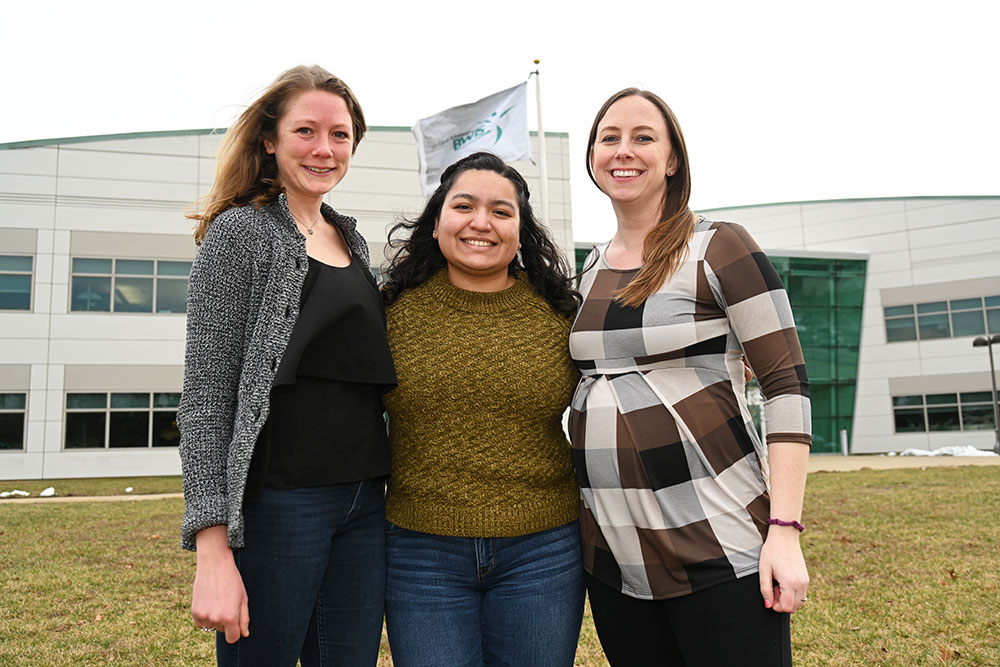On International Women's Day, Brookhaven Women in Science Members Discuss Gender Equity
Megan Magrum, Jessica Gasparik, and Jennefer Maldonado reflect on the challenges women face in STEM and what can be done to help
March 8, 2023
March 8 marks the annual observance of International Women’s Day, a movement to promote universal women’s suffrage that originated in New Zealand in the early 1900s. By 1977, it was officially recognized by the United Nations as an international holiday. While it’s a great time to honor and celebrate the historic contributions of women and the advances that have been made regarding gender equality, it’s also a time to acknowledge the challenges that women still face and how all can collectively rise to meet them.
Women make up just about half of the world’s population, but in the world of science, engineering, technology, and math (STEM), they are still a minority. At the U.S. Department of Energy's Brookhaven National Laboratory, in 2022, women only made up 25.86% of the workforce. That number gets even smaller as you drill down into specific roles. Women made up just 14.66% of research and technical management positions and only 12.69% of technical research staff. This isn’t unique to Brookhaven Lab, and there are many STEM institutions with far bleaker statistics.
What is building this barrier?
“Women are often regarded as the default parent for childcare,” explained Megan Magrum, President of Brookhaven Women in Science (BWIS), interim manager of the Lab's Safety & Health Services Division, and manager of the Industrial Hygiene Program. “Nature just published an article that found nearly half of US female scientists leave full-time science after their first child. It’s difficult to find reliable, affordable childcare. This was always an issue, but the pandemic exacerbated it. Some childcare facilities shut down based on COVID cases and parents are staying home for a week or two. I think that having the childcare facility come back to the Lab will be a huge benefit to families. Assistance with childcare is something that makes a big impact in retaining women while they're pursuing families.”
Bringing women into STEM careers and retaining them there is a multifaceted problem. Even without the variable of children, there are still hurdles women need to jump over that their male colleagues may not need to in order to succeed.
“Women have historically been underrepresented and uncredited,” said Jessica Gasparik, president-elect of BWIS and physics associate at Brookhaven’s NASA Space Radiation Laboratory (NSRL). “These problems are documented and quantifiable. There is a paper in Nature that explores gender inequity in citation practices in physics. You can point to studies and papers to show that these biases are still happening.”
“I work in the Collider-Accelerator Division (C-AD),” said Jennefer Maldonado, social media officer for BWIS and senior applications analyst for controls and applications in the controls group. “It’s just me and two other women in my group. An important reason for me joining BWIS was to see and relate to other people like me in other areas of the Lab and learn from their experiences. When I post content, I like to highlight everybody I can in the group, because it's just so important to acknowledge these different paths and perspectives.”
The goal of BWIS is “promoting equal opportunity and advancement for all women in support of world-class science,” but that doesn’t mean it’s a group that only accepts and benefits women and scientists.
“BWIS is for everyone,” said Magrum, “though the name can be a little deceiving. There is a misconception that the group is only for women or only for scientists. We have a number of men that are members and take an active role. We would love to have more representation from men, especially the perspective of those who are early in their careers here. We also want to encourage more women from departments that help facilitate research. Whether it’s organizational, administrative, operational, or creative roles, these women play in important role in the research that happens here. BWIS is for anyone who wants to support science.”
So many of the issues that plague women in STEM are so deeply woven into our culture and history, but organizations like BWIS are doing what they can at an organizational level to be a resource as well as a catalyst for change. Its members organize several programs, awards, and scholarships to help advance women in this field.
During Women’s History Month, it’s important to remember that there are a number of ways to get involved and learn more about women’s contributions to STEM fields. These are also great opportunities to meet people from different areas of the lab and start conversations on important topics related to diversity, equity, and inclusion.
Brookhaven National Laboratory is supported by the Office of Science of the U.S. Department of Energy. The Office of Science is the single largest supporter of basic research in the physical sciences in the United States and is working to address some of the most pressing challenges of our time. For more information, visit science.energy.gov.
Follow @BrookhavenLab on Twitter or find us on Facebook.
2023-21134 | INT/EXT | Newsroom










